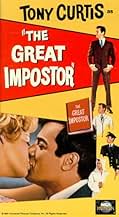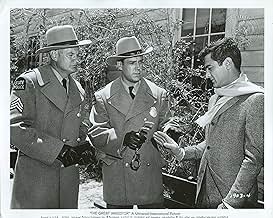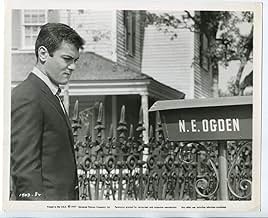AVALIAÇÃO DA IMDb
6,9/10
1,8 mil
SUA AVALIAÇÃO
Adicionar um enredo no seu idiomaFerdinand Waldo Demara Jr. is a versatile man who gets his kicks out of impersonating a marine, a monk, a navy surgeon and a prison warden, eventually getting in trouble with the law for it.Ferdinand Waldo Demara Jr. is a versatile man who gets his kicks out of impersonating a marine, a monk, a navy surgeon and a prison warden, eventually getting in trouble with the law for it.Ferdinand Waldo Demara Jr. is a versatile man who gets his kicks out of impersonating a marine, a monk, a navy surgeon and a prison warden, eventually getting in trouble with the law for it.
- Direção
- Roteiristas
- Artistas
- Prêmios
- 2 indicações no total
Dick Sargent
- Hotchkiss
- (as Richard Sargent)
Robert Crawford Jr.
- Fred Demara Jr.
- (as Robert Crawford)
- Direção
- Roteiristas
- Elenco e equipe completos
- Produção, bilheteria e muito mais no IMDbPro
Avaliações em destaque
That this movie, made in 1961, wasn't the inspiration for Frank Abagnale (Catch me if you can), the bit Spielberg/DeCaprio/Hanks hit currently in theaters. When I saw the promos for CMIYC I thought, "Hey! This is a remake of an old Tony Curtis film!"
The IMDB search shows that The Great Impostor was made in 1961; Frank Abagnales adventures as an imposter started in '62 or '63. Wonder if he saw the film?
I can't remember if I loved The Great Impostor or not but I'm guessing I did; the plot is sooooooooo similar to Catch Me If You Can and I liked that film quite a lot!
The IMDB search shows that The Great Impostor was made in 1961; Frank Abagnales adventures as an imposter started in '62 or '63. Wonder if he saw the film?
I can't remember if I loved The Great Impostor or not but I'm guessing I did; the plot is sooooooooo similar to Catch Me If You Can and I liked that film quite a lot!
This very interesting film was based upon a book of the same name, in turn, based upon the extremely unorthodox life of Ferdinand Demara.
Watching this film naturally leads us to the question of what motivated Demana to lead this semi-criminal life? Is he a compulsive snake?: one who must periodically shed his skin because he needs new types of challenges periodically to avoid boredom? Or is he playing a cat and mouse game, periodically testing whether he can, once again, beat the system in assuming the identity of someone else? I suspect some of both. Unlike as shown in the film, he actually joined a monastery for several years when he ran away from home at age 16. I would think it extremely unusual for a restless teen to do so. I think that should tell us something about his psychological state.
There is always the problem of a few people who meet the bureaucratic requirements for a profession or advanced schooling but lack real life competency vs. those who are or show promise of being quite competent but lack the bureaucratic criteria for being accepted as an advanced student or as a professional.
The film dramatizes only a few of Demara's impersonations, albeit some of the most astounding. His attempt to reform the typical brutality in prisons was one highlight. However, his masquerading as a doctor in the Canadian Navy during the Korean war is the most unbelievable segment. Included is his historical surgery on several wounded Koreans while aboard ship.
I wonder if he had gotten married if he would have settled down? The fact that he tried to make it as a monk in his early adulthood may suggest that he didn't have marriage in his plans. Incidentally, Sue Anne Langdon sure was cute and vivacious as an aggressive man eater!
Demana is shown faking a suicide. This really happened.
I'm very surprised that this film was shot in B&W at this late date(1961), although Universal was a notoriously cheap studio.
Watching this film naturally leads us to the question of what motivated Demana to lead this semi-criminal life? Is he a compulsive snake?: one who must periodically shed his skin because he needs new types of challenges periodically to avoid boredom? Or is he playing a cat and mouse game, periodically testing whether he can, once again, beat the system in assuming the identity of someone else? I suspect some of both. Unlike as shown in the film, he actually joined a monastery for several years when he ran away from home at age 16. I would think it extremely unusual for a restless teen to do so. I think that should tell us something about his psychological state.
There is always the problem of a few people who meet the bureaucratic requirements for a profession or advanced schooling but lack real life competency vs. those who are or show promise of being quite competent but lack the bureaucratic criteria for being accepted as an advanced student or as a professional.
The film dramatizes only a few of Demara's impersonations, albeit some of the most astounding. His attempt to reform the typical brutality in prisons was one highlight. However, his masquerading as a doctor in the Canadian Navy during the Korean war is the most unbelievable segment. Included is his historical surgery on several wounded Koreans while aboard ship.
I wonder if he had gotten married if he would have settled down? The fact that he tried to make it as a monk in his early adulthood may suggest that he didn't have marriage in his plans. Incidentally, Sue Anne Langdon sure was cute and vivacious as an aggressive man eater!
Demana is shown faking a suicide. This really happened.
I'm very surprised that this film was shot in B&W at this late date(1961), although Universal was a notoriously cheap studio.
Tony Curtis portrays "Ferdinand Waldo Demara Jr.," who faked being a doctor, warden, monk and teacher. When I saw this at the theater 45 years ago, I thought it was fascinating. Much older and seeing it on tape about 10 years ago, it wasn't as interesting as I had remembered. I guess when you're a kid, everything on the big screen is impressive.
Humor helped in this film, giving it some life here and there as it's a bit slow-moving but still entertaining. I've usually found Curtis entertaining to watch, a man who played a lot of interesting characters. I still think he is/was an underrated actor, too.
It was nice seeing the main character, although being a fake, still asking for God's help in certain situations, inside knowing he was not doing the right thing. Those parts would be edited out if the film was re-made today. I agree, too, with a fellow reviewer that faking being a surgeon is not something to be laughed at, especially if he was doing his operating on you or me!
Humor helped in this film, giving it some life here and there as it's a bit slow-moving but still entertaining. I've usually found Curtis entertaining to watch, a man who played a lot of interesting characters. I still think he is/was an underrated actor, too.
It was nice seeing the main character, although being a fake, still asking for God's help in certain situations, inside knowing he was not doing the right thing. Those parts would be edited out if the film was re-made today. I agree, too, with a fellow reviewer that faking being a surgeon is not something to be laughed at, especially if he was doing his operating on you or me!
"The Great Impostor" is quintessential Tony Curtis. Curtis was never an exceptional screen actor but a decent one, probably more for his good looks and charisma than his ability to become different people. He is in the category of what I call "charisma actors". (I would include Tom Cruise and Brad Pitt in the same category.) Charisma actors are talented and can be very convincing given the right role. And this was the right role for Curtis.
"The Great Imposter" tells the true story of Ferdinand Waldo Demara (Curtis) who was chronicled in a novelistic book of the same name written by Robert Crighton (who also wrote "The Secret of Santa Vittoria"). Demara assumed different identities, such as a monk, a sheriff's deputy, and notably, a prison warden, usually without the expected credentials. Probably the exploit he is most known for which brought him both recognition but exposed his chicanery was becoming a ship's surgeon for the Canadian military during the civil war in Korea. And he didn't have a medical degree!
Curtis was perfect casting as Demara. He makes his character fun and likeable. The real Demara was somewhat heavy-set, unlike Curtis. However, Curtis captures the essence of Demara's likability which was probably the reason for his success. The real Demara found ways of inserting himself to situations without alienating or threatening those already there. While the movie exaggerates a little bit the outcomes of some of Demara's ventures, it's a fun and thoroughly entertaining film. Not one which will go down in the annals of the greatest movies ever made, but it holds its own. A must for Curtis fans.
"The Great Imposter" tells the true story of Ferdinand Waldo Demara (Curtis) who was chronicled in a novelistic book of the same name written by Robert Crighton (who also wrote "The Secret of Santa Vittoria"). Demara assumed different identities, such as a monk, a sheriff's deputy, and notably, a prison warden, usually without the expected credentials. Probably the exploit he is most known for which brought him both recognition but exposed his chicanery was becoming a ship's surgeon for the Canadian military during the civil war in Korea. And he didn't have a medical degree!
Curtis was perfect casting as Demara. He makes his character fun and likeable. The real Demara was somewhat heavy-set, unlike Curtis. However, Curtis captures the essence of Demara's likability which was probably the reason for his success. The real Demara found ways of inserting himself to situations without alienating or threatening those already there. While the movie exaggerates a little bit the outcomes of some of Demara's ventures, it's a fun and thoroughly entertaining film. Not one which will go down in the annals of the greatest movies ever made, but it holds its own. A must for Curtis fans.
Tony Curtis may not have been the greatest of actors (though he did give some great performances), but he was very charismatic and immensely likeable and improved hugely with each film, it was very difficult to dislike him even early in his career. Reading the subject matter gave the impression that 'The Great Imposter' would be interesting and entertaining. There is also a good deal of talent in the cast.
Luckily, 'The Great Imposter' turned out to be exactly that, exactly what it seemed it would be on paper. It was interesting and it was very entertaining, the latter being especially strong, those two being its main objectives and they were achieved. Won't say it was a masterpiece or classic cinema because it wasn't, not everything works, but like Curtis one cannot be too hard on 'The Great Imposter' with so much working in its favour. It knows what it wants to be, who to aim it at and shows a lot of effort without trying to bite more than it can chew or play it too safe.
Would have liked DeMura's motivations to have gone into depth more or properly explored/explained, this aspect felt underdeveloped.
Also didn't buy his reform, which felt rushed and too pat to me, but that's personal opinion.
On the other hand, 'The Great Imposter' looks attractive, especially in the photography, and is assuredly directed. The music is never intrusive, low-key, obvious or repetitive, it fits well and not hard at all to remember.
While the facts and subject are adapted loosely and the tone significantly more light-hearted compared to the biography, of which it is a loose adaptation of, the light-hearted wit is infectious, it doesn't get too camp or silly and those unfamiliar with the man and story before seeing the film will find themselves wanting to learn more. The story is crisply paced and while odd in places (in an appealing way) it doesn't get too hard to follow. The surgery scene is priceless and avoids the trap of falling into distaste, do agree though it is not a subject to be laughed or poked fun at usually.
Did worry as to whether Curtis would be able to handle multiple roles and whether he would pull it off, but didn't need to be. He does splendidly here, we have as much fun as he clearly did, and one can really see how much he grew as an actor from when he first started a decade or so before. Raymond Massey, Edmund O'Brien and Karl Malden are particularly note-worthy in support.
All in all, lots of fun. 8/10 Bethany Cox
Luckily, 'The Great Imposter' turned out to be exactly that, exactly what it seemed it would be on paper. It was interesting and it was very entertaining, the latter being especially strong, those two being its main objectives and they were achieved. Won't say it was a masterpiece or classic cinema because it wasn't, not everything works, but like Curtis one cannot be too hard on 'The Great Imposter' with so much working in its favour. It knows what it wants to be, who to aim it at and shows a lot of effort without trying to bite more than it can chew or play it too safe.
Would have liked DeMura's motivations to have gone into depth more or properly explored/explained, this aspect felt underdeveloped.
Also didn't buy his reform, which felt rushed and too pat to me, but that's personal opinion.
On the other hand, 'The Great Imposter' looks attractive, especially in the photography, and is assuredly directed. The music is never intrusive, low-key, obvious or repetitive, it fits well and not hard at all to remember.
While the facts and subject are adapted loosely and the tone significantly more light-hearted compared to the biography, of which it is a loose adaptation of, the light-hearted wit is infectious, it doesn't get too camp or silly and those unfamiliar with the man and story before seeing the film will find themselves wanting to learn more. The story is crisply paced and while odd in places (in an appealing way) it doesn't get too hard to follow. The surgery scene is priceless and avoids the trap of falling into distaste, do agree though it is not a subject to be laughed or poked fun at usually.
Did worry as to whether Curtis would be able to handle multiple roles and whether he would pull it off, but didn't need to be. He does splendidly here, we have as much fun as he clearly did, and one can really see how much he grew as an actor from when he first started a decade or so before. Raymond Massey, Edmund O'Brien and Karl Malden are particularly note-worthy in support.
All in all, lots of fun. 8/10 Bethany Cox
Você sabia?
- CuriosidadesTony Curtis as Demara is shown boarding HMCS Cayuga (a Tribal Class destroyer), which was the actual ship the real Demara sailed in.
- Erros de gravaçãoDemara is assigned to HMCS Cayuga on 16 June 1951. However, in the Captain's cabin, there is a picture on the wall of Queen Elizabeth II, who ascended the throne on 6 February 1952 on the death of her father, King George VI. Also, the portrait appears to be the 1956 Pietro Annigoni painting of the queen.
- Citações
Ferdinand Waldo Demara Jr.: Help me dear God, I don't want to kill anybody.
- ConexõesFeatured in Inacreditável com William Shatner: Leading Double Lives (2020)
Principais escolhas
Faça login para avaliar e ver a lista de recomendações personalizadas
- How long is The Great Impostor?Fornecido pela Alexa
Detalhes
- Data de lançamento
- País de origem
- Idiomas
- Também conhecido como
- The Great Impostor
- Locações de filme
- Los Angeles, Califórnia, EUA(Griffith Park)
- Empresa de produção
- Consulte mais créditos da empresa na IMDbPro
- Tempo de duração1 hora 53 minutos
- Cor
- Proporção
- 1.85 : 1
Contribua para esta página
Sugerir uma alteração ou adicionar conteúdo ausente

Principal brecha
By what name was O Grande Impostor (1960) officially released in India in English?
Responda







































